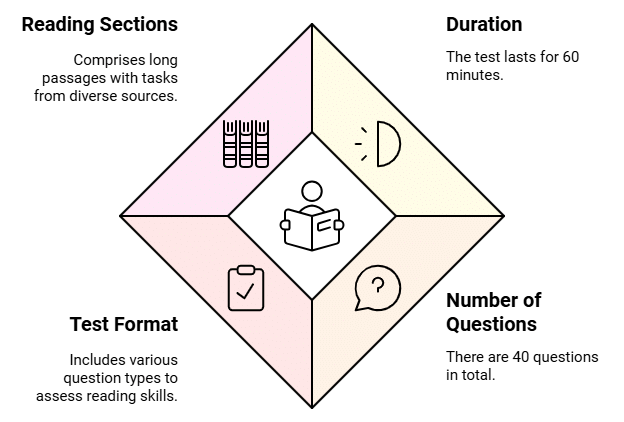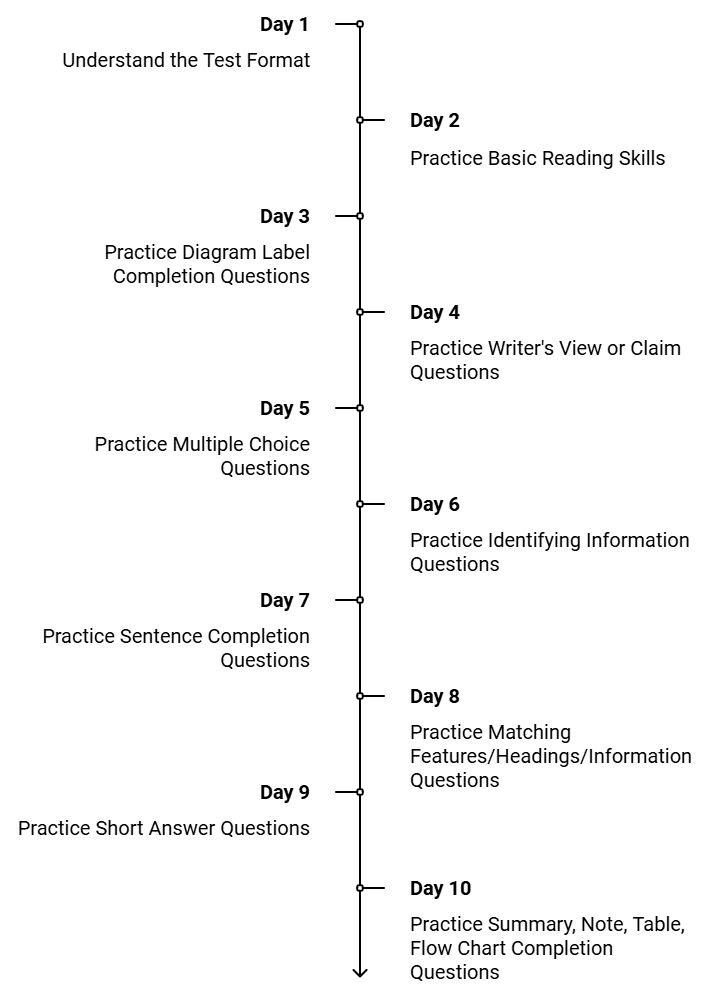14-Day Study Plan for IELTS Academic ReadingTest | Reading for Academic IELTS PDF Download
The IELTS Academic Reading test is a section of the International English Language Testing System (IELTS) that assesses your reading comprehension skills. The test evaluates your ability to understand the main ideas, details, and implied meanings in texts. It also tests your ability to follow an argument, recognize a writer's opinion, and understand their purpose.
Here are some more details about the Academic Reading Test:

Duration: 60 minutes
No. of questions: There are 40 questions. A variety of different question types are used.
Test format: You will also need to identify the opinions, attitudes, and purpose of the writers. The question types used in this component vary to test different reading techniques, such as skimming and understanding the writer's perspective.
Reading – Academic
- For each section, you will be given one long reading passage with tasks.
- All the topics are of general interest to students at the undergraduate or postgraduate level.
- The texts may be written in different styles and may contain diagrams, graphs, or illustrations.
- The texts will come from a variety of sources (e.g. books, journals, newspapers)

Day 1: Understand the Test Format
- Familiarize with the Exam Structure and Pattern: Focus on How to Prepare for IELTS Academic Reading Test.
- Learn Tips and Tricks: Watch videos to learn how to answer different types of questions.
Day 2: Practice Basic Reading Skills
- Work on Skimming and Scanning: Use newspapers or articles to practice reading headlines, subheadings, and key sentences. Identify the main idea of paragraphs without reading every word.
- Build Vocabulary: Note unfamiliar words, look up their meanings, and use them in sentences. Focus on synonyms and paraphrases commonly used in academic contexts.
Day 3: Practice Diagram Label Completion Questions
- Understand the Question Format: Requires labelling parts of a diagram based on the information in the passage.
- Watch Videos: Learn strategies to quickly locate relevant parts of the passage. Practice using context clues to interpret and label diagrams accurately.
Day 4: Practice Writer's View or Claim Questions
- Understand the Question Format: Identify whether the writer agrees, disagrees, or expresses no opinion on a statement.
- Watch Videos: Gain insights into identifying subtle clues that reveal the writer's perspective. Practice distinguishing between explicit statements and implied meanings.
Day 5: Practice Multiple Choice Questions
- Understand the Question Format: Choose one correct answer or multiple correct answers from a set of options.
- Watch Videos: Learn techniques to eliminate incorrect options. Understand how to identify keywords and paraphrases in the passage.
Day 6: Practice Identifying Information Questions
- Understand the Question Format: Determine if the information is True, False, or Not Given.
- Watch Videos: Explore tips for distinguishing between "False" and "Not Given" information. Practice scanning the passage for relevant details.
Day 7: Practice Sentence Completion Questions
- Understand the Question Format: Complete sentences using words or phrases from the passage.
- Watch Videos: Learn methods to identify and extract relevant information efficiently. Understand how to adapt sentence fragments into grammatically correct completions.
Day 8: Practice Matching Features/Headings/Information Questions
- Understand the Question Format: Match headings to paragraphs or match features to corresponding descriptions.
- Watch Videos: Learn to spot keywords and phrases that connect headings to paragraphs. Understand how to avoid confusion between similar headings.
Day 9: Practice Short Answer Questions
- Understand the Question Format: Write concise answers based on the passage, often within a word limit.
- Watch Videos: Explore strategies for pinpointing answers quickly. Learn to rephrase questions to guide your search in the passage.
Day 10: Practice Summary, Note, Table, Flow Chart Completion Questions
- Understand the Question Format: Fill in blanks to complete summaries, notes, or tables using information from the passage.
- Watch Videos: Discover tips for matching keywords in the passage to blanks. Practice identifying relationships between summarized information and the text.
Day 11-13: Take Practice Tests for Reading
- Simulate Real Test Conditions: Complete the entire test within 60 minutes without breaks. Use a quiet environment to replicate exam conditions.
Analyze Your Performance: Review mistakes and identify patterns in errors. Focus on weak question types to improve accuracy.
Day 14: Final Preparation and Relaxation
- Revise Key Points: Go through vocabulary lists, linking phrases, and key cue card responses.
- Revisit Recordings: Listen to your practice recordings from earlier days to boost confidence.
|
27 videos|77 docs
|
FAQs on 14-Day Study Plan for IELTS Academic ReadingTest - Reading for Academic IELTS
| 1. What is the best way to improve my IELTS Academic Reading score in 14 days? |  |
| 2. How many passages are there in the IELTS Academic Reading test? |  |
| 3. What types of questions can I expect in the IELTS Academic Reading section? |  |
| 4. How can I manage my time effectively during the IELTS Reading test? |  |
| 5. Should I focus on improving my vocabulary for the IELTS Academic Reading test? |  |





















